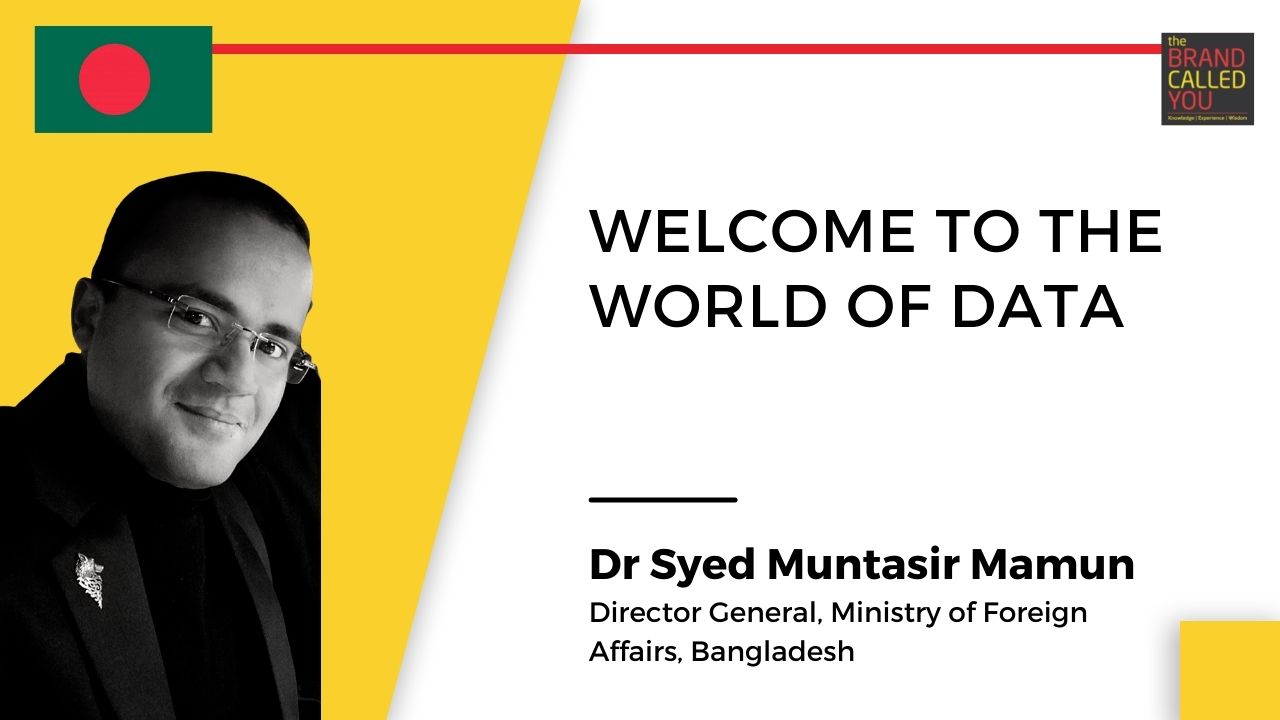Dr. Syed Muntasir Mamun, Director General, Ministry of Foreign Affairs, Bangladesh
Author of “Blockchain: Gaming & Collusion – A Reading in Political Economy”
Podcast
Overview
We are surrounded by technology. From getting up by an alarm to the last thing we do in the night before we sleep we are sharing a lot of information which is being recorded somewhere through these technologies. They have become an extension to our bodies and we do not even realize it. Hear from our guest today, Dr. Syed Muntashir Mamun about the uses of these technologies in framing policies and developing the country overall.
Dr. Syed Muntashir Mamun is the Director-General of the Ministry of Foreign Affairs in Bangladesh. He has studied and taught at the University of Oxford. He is an author of the book ‘Blockchains- Gaming and Collusion: A Reading in Political Economy’
In this episode of The Brand Called You, we get to know about the diverse scope of technology and how it is being deployed. In the conversation with our host, Mamun tells us about his research on technology and his breathtaking findings on the subject. We become familiar with how blockchain works and how it is taking over the markets. We also come across the usage and design of the blockchain.
Discussion:
Mamun’s work at the Ministry of Foreign Affairs
Mamun jokingly says that his work in the ministry is to take the blame. He later explains that he looks after the trade, investment, ICT, and technology division in the ministry. He calls Bangladesh a Trading Nation and wishes to attract maximum trade in the country.
About Mamun’s book
Mamun tells us that he was intrigued by the scope of technology. As he got deeper into the subject, many things started to unfold in front of his eyes. In the time of three years, while he was researching, he found a diverse nature of technology like the political environment of it, the ambiance of it, etc. He started with the hypothesis that blockchains would be the carrier technology that would take us to the future, but their research showed something completely different. They understood that the entire universe was getting a rebirth. Everything connected with technology was changing. Mamun calls his book a handbook for the human to understand technology politics with regards to blockchains and how you put humans at the center of that political framework which ultimately leads us to Artificial Intelligence.
Mamun’s thoughts on blockchains reducing information asymmetry and ensuring data security
On being asked about information transparency, Mamun affirms this is what blockchain precisely does. He compares the blockchain network with a tree. Every leaf on the branches of the tree is authenticated by it and so we are sure that the leaf is original and has certain properties, likewise, blockchains have bits carrying information that is authenticated by it. Hence, blockchain provides transparency. Blockchain is also called a ‘stressless keyless system’. Blockchain is also capable of reducing information asymmetries. In terms of data security, Mamun proclaims the design of blockchains to be impregnable. However, he speculated that if someone compromises with the arrangement of the nodes, the information could get endangered. Mamun suggests that there are many ways to handle the data protection issue; two broad ways might be political ways of handling, this can be done by ensuring that each individual has the full protection of his data available in the public domain. Another way could be making arrangements for the design of blockchain to ensure immunity.
Blockchain and E-Governance
Mamun proclaims that they are planning to introduce blockchain in Bangladesh. He adds that in his country, they look at governance by looking at the inclusivity of the last man’s last mile. He explains that if they could reach the last human living in the last mile of the country with all the services on offer, the governance is ensured. This is the core of E-Governance. It is supported by connecting the factor markets with the consumer markets. This fills the void. In Mamun’s opinion, blockchains help to combine these two factors seamlessly.
Combining technologies to establish a smart city.
Mamun shares that his country is densely populated. They’ll have to make sure that the systems of each individual are connected in a seamless manner so that the information and authentication of that information are in sync in real-time so that the cost of obtaining the information can be minimal. If that happens, that could give rise to innovation and entrepreneurship as information leads to ideas. One of their hypotheses is if they are able to connect the IoT devices with the blockchain and human innovation system, it might lead them to an area that has AI irretrievably deployed. These things could ultimately lead them to develop a smart city.
Technology and Agribusiness
Mamun suggests that introducing blockchain could prove to develop agribusiness. They plan to connect the individual farm holds to markets with the help of blockchain to eliminate the middlemen.
E-Governance
Mamun tells us that since their country is not much old, they are still experimenting with things. They have a concept called TCV sandbox. It stands for Time, Cost, and Visit. He explains that if they could minimize the time, cost, and visits to a service provider, then they are achieving a certain level of optimized governance. He adds that his country believes in a fundamental equation, which means that accountability should be equal to authority and responsibility. If these things are in sync, technology can be introduced in a stressless keyless system, where the system itself takes care of things.
Risks involved in E-Governance
Mamun fears that if technology is not managed efficiently, it could go out of hand. Technology is very important and we are using it for our benefit but still, there are a lot of flaws.


